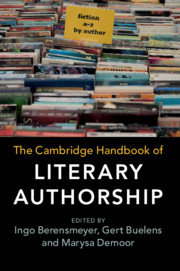Book contents
- The Cambridge Handbook of Literary Authorship
- The Cambridge Handbook of Literary Authorship
- Copyright page
- Contents
- Figures
- Contributors
- Acknowledgments
- Abbreviations
- Chapter 1 Introduction
- Part I Historical Perspectives
- Part II Systematic Perspectives
- Part III Practical Perspectives
- Chapter 20 Attribution
- Chapter 21 Anonymity and Pseudonymity
- Chapter 22 Plagiarism and Forgery
- Chapter 23 Authorship and Scholarly Editing
- Chapter 24 Copyright and Literary Property
- Chapter 25 Censorship
- Chapter 26 Publishing and Marketing
- Chapter 27 Institutions
- Select Bibliography
- Index
Chapter 24 - Copyright and Literary Property
The Invention of Secondary Authorship
from Part III - Practical Perspectives
Published online by Cambridge University Press: 07 June 2019
- The Cambridge Handbook of Literary Authorship
- The Cambridge Handbook of Literary Authorship
- Copyright page
- Contents
- Figures
- Contributors
- Acknowledgments
- Abbreviations
- Chapter 1 Introduction
- Part I Historical Perspectives
- Part II Systematic Perspectives
- Part III Practical Perspectives
- Chapter 20 Attribution
- Chapter 21 Anonymity and Pseudonymity
- Chapter 22 Plagiarism and Forgery
- Chapter 23 Authorship and Scholarly Editing
- Chapter 24 Copyright and Literary Property
- Chapter 25 Censorship
- Chapter 26 Publishing and Marketing
- Chapter 27 Institutions
- Select Bibliography
- Index
Summary
The world’s first copyright act established a contradiction between access to content and the rights of the creator (or the purchaser of his or her copies) that has yet to be resolved more than three hundred years later.2 The right to print and reprint books as recognized in the Statute of Anne (1710) only lasted for a limited period (fourteen years if the book was new; a further fourteen if the author remained alive at the end of the initial period), though this gradually increased in the ensuing centuries. The 1842 Copyright Act provided post mortem protection to authors for the first time – this was further strengthened in Britain under the 1911 Copyright Act, which gave protection for fifty years after the author’s death, and which was extended to seventy years in 1995, in line with EU legislation.
- Type
- Chapter
- Information
- The Cambridge Handbook of Literary Authorship , pp. 384 - 399Publisher: Cambridge University PressPrint publication year: 2019



